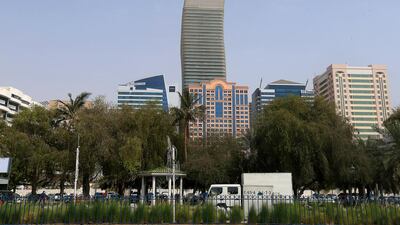Eighteen months after Abu Dhabi removed a 5 per cent rent cap for properties in the capital, questions are being raised about what, if anything, will replace it.
With rents in the city rising steadily over the past 18 months, stories abound of some long- term tenants facing demands from landlords for yearly rent increases of as much as 50 per cent.
And, despite reports of a slowdown in rent rises this year, calls are again mounting for the government to reinstate rent controls to prevent lower-paid workers from being priced out and to attract institutional investors to Abu Dhabi.
“Although rents in Abu Dhabi appear to be stabilising at the moment, the danger remains that prices could hike again,” said Matthew Dadd, a senior surveyor at Knight Frank real estate consultants. “When moving to a new city it creates another hurdle to cross, which could affect Abu Dhabi’s competitiveness to attract people to live and work here.”
In November 2013, the Abu Dhabi Executive Council abolished the 5 per cent cap on rent increases in the city.
The municipality had been expected to introduce a Dubai-style rent index, which would have divided the city into 10 to 12 zones and set a guide rent for each. But despite suggestions that the index would be finalised last year and rumours that officials had analysed the rental portfolios of Abu Dhabi Islamic Bank and Abu Dhabi Commercial Bank, no policy has been implemented.
It is understood that government authorities attempting to implement the new index found Abu Dhabi’s complicated mix of city centre housing more difficult to assess and categorise than had been originally envisaged and the municipality has been once again considering implementing a flat rate cap.
A lack of clear information fed a flurry of rumours of a new flat rate rent cap of 7 per cent being introduced, spread by text message from worried tenants and eager landlords.
The rumours, it turned out, were based on a story by The National's Arabic-language sister newspaper Al Ittihad that was published in 2006.
However, the fact that the rumours were so quickly accepted and spread illustrates the level of uncertainty present in the city, where rents form a key part of most people’s monthly outgoings and remain a key consideration for expats when deciding whether to remain for another year.
The lack of clarity has also increased the number of rental disputes going through the Abu Dhabi courts, landlords report.
“Clarification on the role of the rental dispute committee is urgently required,” said Frank O’Dwyer, director of property management at MPM Properties, the property branch of Abu Dhabi Islamic Bank.
“Its remit in regards to rent disputes was clear when the rent cap of 5 per cent was in place. However, today [the lack of clarity] is causing delays and uncertainty for both landlords and tenants and inconvenience to the property management companies.”
The lack of information, coupled with little news coming from the authorities about when, if ever, the emirate will introduce a proposed new property law, is putting some overseas investors off of investing in real estate in the city, landlords add.
There was much speculation at Cityscape Abu Dhabi as to when the long-awaited legislation – likely to introduce owners associations, strata title regulations and other key property laws – would be enacted. Such a law could include a reference to a rent cap.
It is understood that plans to introduce the new laws have been delayed as authorities liaise with Abu Dhabi’s new financial free zone, Abu Dhabi Global Marketplace, which is in the process of introducing its own set of real estate regulations.
“Real estate laws are critical in attracting international institutional investors and high net-worth investors, who are currently waiting on the sidelines or investing in Dubai in the interim,” said Vaibhav Sharma, the head of strategic and investment advisory at MPM Properties.
“We are currently advising a number of institutional investors, who are eagerly awaiting announcement of Abu Dhabi’s real estate laws before completing their due diligence and committing to invest within Abu Dhabi’s investment zones.”
Despite the lack of a rent cap or pricing guidelines, the main reason for recent rent rises remains the lack of available housing in the capital.
“The rent cap never really kept rents down,” said Ben Crompton, the managing director of Abu Dhabi estate agent Crompton Partners. “It just made rents more expensive for people coming into the city or moving. The only way in the end to ensure that rents are affordable is to build more affordable housing, and at the moment there is very little new stock in the pipeline in the capital.”
lbarnard@thenational.ae
Follow The National's Business section on Twitter

